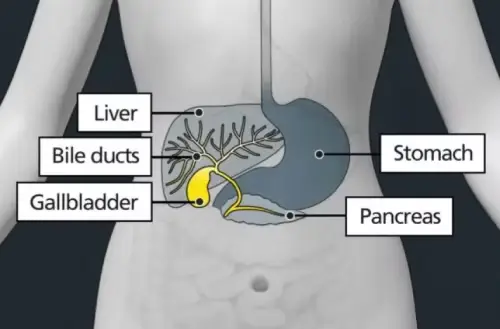Biliary tract cancers are the cancers that can start in the bile ducts or the gallbladder. The bile ducts and gallbladder together are known as the biliary system.

Bile duct cancer
Bile duct cancer (also called cholangiocarcinoma) is a rare cancer that starts in the lining of the bile duct and can be found anywhere in the bile ducts.
The bile ducts are the small tubes that connect the liver and the gallbladder to the small bowel. They carry bile and are part of the digestive system, sometimes called the gastro-intestinal or GI tract.
Bile is a fluid that helps with breaking down fats from the food and with digesting them. It is made by the liver and stored in the gallbladder.
Bile duct cancer can have no symptoms, or they might be hard to spot.
Symptoms of bile duct cancer can include:
- jaundice - the whites of the eyes or the skin turn yellow
- itchy skin
- paler poo and darker urine (pee) than usual
- loss of appetite or losing weight without trying to
- feeling generally unwell
- feeling tired or having no energy
- a high temperature, or feeling hot or shivery
- feeling or being sick
The types of bile cancer are named after the part of the bile duct where the cancer started, and these include intrahepatic and extrahepatic bile duct cancers. The extrahepatic bile duct cancers are then further categorised into two sub-types: perihilar and distal bile duct cancers.
Gallbladder cancer
Gallbladder cancer is a rare cancer that starts in the gallbladder. It occurs when abnormal cells in the gallbladder start to divide and grow in an uncontrolled way.
The gallbladder is a small organ, a pouch that stores bile and helps digest the food. It is part of the digestive system.
Early gallbladder cancer does not usually cause any symptoms. Most gallbladder cancers are only found at an advanced stage.
Symptoms of gallbladder cancer can include:
- jaundice - the whites of the eyes or the skin turn yellow
- itchy skin
- paler poo and darker urine (pee) than usual
- loss of appetite or losing weight without trying to
- a high temperature, or feeling hot or shivery
- a lump in the tummy
- sharp pain in the tummy
- feeling or being sick
There are different types of gallbladder cancer, the most common type is adenocarcinoma, which is the cancer that starts in gland cells in the gallbladder lining. These cancers are then further categorised into three sub-types: non papillary, papillary and mucinous adenocarcinomas of the gallbladder.
Other, rarer types of gallbladder cancer include:
- squamous cell cancer
- adenosquamous cancer
- small cell cancer
- sarcoma
- neuroendocrine tumour
- lymphoma and melanoma
Treatment for biliary tract cancers at CUH
The treatment you have depends on several factors, which include:
- the type and size of the cancer
- where the cancer is located
- your general health
- whether the cancer has spread
A team of specialists at CUH will meet to discuss your condition and to make a recommendation about the best possible treatment for you.
You, along with your clinician, will then discuss your treatment recommendations at the clinic appointment and decide on the right treatment plan for you. Your clinician will explain the different treatment options and possible side effects.
Biliary tract cancers are often treatable, but can be difficult to treat or cure.
The treatment for biliary tract cancers can include:
- surgery
- systemic therapy
- radiotherapy
- targeted therapy
- immunotherapy
You may be able to have surgery to remove cancer, if your biliary tract cancer is found early and it has not spread. Surgery will remove part or all of the bile duct or gallbladder. The surgeon may also need to remove parts of other organs or lymph nodes around the area affected by cancer. Lymph nodes are part of the body's immune system. Recovery from surgery can take a long time. Sometimes, chemotherapy is given after surgery to help reduce the chance of the cancer returning.
Unfortunately, surgery may not be possible due to the location, size or spread of biliary tract cancer. In this case, oncologists may recommend drug therapies, including chemotherapy in combination with immunotherapy.
It is now recognised that approximately 20-40% of biliary tract cancers exhibit specific genetic changes (called gene mutations or fusions) that may be linked to growth of the cancer. Some of these changes can be targeted using newer biological drugs, which can be offered routinely or within clinical trials. Molecular profiling to assess these genetic changes requires sufficient tissue available for analysis. Your doctor will advise whether this testing is appropriate for your case. If molecular profiling is undertaken, the results are typically available within three to four weeks, at which point your doctor will explain the findings and their implications with you.
Bile duct cancers are difficult to treat. A particular problem is the blockage of bile ducts, which can lead to strictures and jaundice.
At times, you may require more than one treatment or a combination of different treatments to achieve the best outcome in managing your condition.
Occasionally you may be invited to participate in clinical research studies if they are available, however they may not be suitable for every patient.

